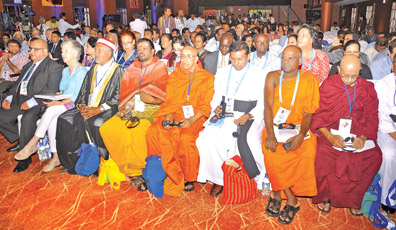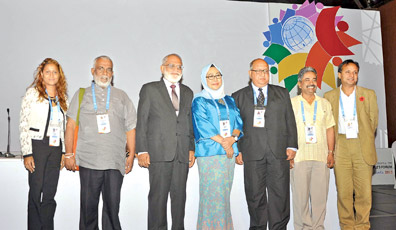|
Commonwealth People’s Forum:
Vibrant discussions on common problems
By Ranil Wijayapala
The Commonwealth People’s Forum (CPF), the largest ever
representation of grassroots level civil society organisations among
Commonwealth nations gathered at the Chaaya Tranz Hotel, Hikkaduwa after
a glittering inauguration ceremony at the historic Galle Fort. They
ended their five-day deliberations from November 10 to 14, on a positive
note, arriving at key recommendations to be made to the Commonwealth
Foreign Ministers meeting.
 |
|
A section of the
delegates at the Forum |
The Commonwealth People’s Forum was formerly known as the NGO Forum
but changed its name at the Commonwealth Heads of Government Meeting in
Perth, Australia in 2011. The CHOGM 2013 was held in an Asian country
the first time in 24 years.
More than 700 delegates representing diverse civil society
organisations of the Commonwealth nations had their deliberations under
the theme 'Equitable Growth and Inclusive Development: Beyond 2015'
while enjoying the scenic beauty of the Sri Lankan beaches in the
tourist city of Hikkaduwa.
The CPF was organised by the Commonwealth Foundation in partnership
with Sarvodaya Shramadana Movement, Sevalanka Foundation, Federation of
Sri Lanka Local Government Authorities and the Government.
At the inauguration ceremony at the Galle Fort, President Mahinda
Rajapaksa, Commonwealth Secretary General Kamalesh Sharma and guests
from the Commonwealth Foundation, Civil Society Organisations and
Government representatives laid a strong foundation to kick start the
deliberations to find effective ways to overcome the challenges faced by
civil societies in Commonwealth Nations.
“It is heartening to see that during the next few days, each of you
will be able to air your views and concerns. More importantly, the
environment will enable you to come together, collectively as one voice,
to explore solutions for the best way forward on the post-2015
development agenda,” President Rajapaksa said.
“I look forward to seeing your Civil Society Statement, which will
provide a solid foundation to facilitate this work, as a people-centric
agenda. One cannot underestimate the creativity, insight and the
specialised knowledge of civil society that will add to the successful
outcome of CHOGM, and subsequently aid its members in the implementation
process,” he said.
“I am certain that you have the capacity and the mandate, to work
with your communities and your leaders, to meet the key issues affecting
our peoples. Your ability to contribute positively will improve and
enrich the lives of our peoples on a daily basis,” the President said.
“I am certain that in the years to come, we will do better, as we
address the related core parameters such as competitiveness, press
freedom, inequality, democracy, gender gap, peace, human development,
youth and environmental performances,” the President said stressing the
fact that Sri Lanka can move forward among the Commonwealth Nations with
positive developments.
The President said that it is crucially important for them to have
feelings for one’s motherland and commitment to her well-being and the
stature and territorial integrity of the country though it is natural to
have diverse opinions in civil society.
 |
|
From left: Vindyani Hettigoda,
Director, Hettigoda Industries (Pvt) Ltd, Harsha Kumara
Navaratne, Chairman, Seva Lanka Foundation, Dr. Lalith
Chandradasa, Chairman, Commonwealth People's Forum, Dr.
Jemilah Mahmood, Founder, MERCY Malaysia, Anand Satyanand,
Chairman, Commonwealth Foundation, Dr. Vinya Ariyaratne,
General Secretary, Sarvodaya Shramadana Movement and Vijay
Krishnarajan, Director, Commonwealth Foundation. |
Chairman of the Commonwealth Foundation, Anand Satyanand said that it
was the first Commonwealth Forum held after the new Commonwealth Charter
was implemented in March 2013.
Commonwealth Secretary General Kamalesh Sharma said that the pulse of
the Commonwealth beats from the civil society organisations and called
on them to protect the Commonwealth Charter.
The keynote address by the founder of MERCY Malaysia, a Medical
Relief Organisation, Dr. Jemilah Mahmood, at the first session of the
People’s Forum on Monday, was on the theme ‘The role of civil society in
post-2015 development architecture, equitable growth and inclusive
development’.
She said that local organisations rarely see the divide between
humanitarianism and development but look at their communities as a
whole. “They need to be recognised and play a more prominent role as
they are the first to assist and the last to leave”, Dr. Jemilah
said.“Civil society actors need to take ownership of being part of the
process of contributing to the formulation of the agenda. This
inevitably means we need to be sitting at the table with policy makers
whether in formal or informal settings and not just be bystanders or
shout from the sidelines”, she said.
“We need to be more savvy in our collective lobbying and advocacy, to
build trust where it has been lost, and to engage in constructive ways
even with the most challenging actors and policy makers.
We need to deal with to push for real and sustainable change. We need
to foster greater acceptance by governments of the role played by civil
society. They should not be seen as a threat, and in equal measure,
civil society should not view governments as the enemy," Dr. Jemilah
said.
The plenary discussions following the opening session on the theme
'Exploring the post-2015 development agenda: Consensus, divergence and
opportunity'.
The workshops were held on the theme 'Equitable Growth, Inclusive and
Sustainable Development'.
Commonwealth People's Forum, Chairman Dr. Lalith Chandradasa said the
opening session was followed by panel discussions and eight concurrent
sessions on unemployment, women empowerment, climate change,
reconciliation, migration, governance and diversity, and creative
expressions.
"Delegates had good discussions and we have prepared the outcome
document, and handed it to the Foreign Ministers meeting for their
consideration and also for consideration at the Heads of Government
meeting," Dr. Chandradasa said.
Accordingly the Commonwealth People's Forum statement called upon
Commonwealth Heads of State and Government to:
1. Recognise, in line with the Istanbul Principles for civil society
development effectiveness and the Busan partnership for development
framework, the centrality of civil society in development and invest in
supporting the conditions that create an enabling environment for civil
society to participate in development processes more fully, proactively
and effectively.
2. Foster development processes that are inclusive, equal, and just.
3. Strengthen institutions and promote processes that support
participatory governance and cross boundary knowledge sharing.
4. Commit to a framework of mutual accountability at the global,
regional and national level.
5. Ensure that all development policies and processes are firmly
grounded in a human rights based approach.
Apart from this the Commonwealth People's Forum also identified great
potential to improve global development effectiveness offered by a new
post-2015 development agenda and recommended 13 issues to be addressed
by the Commonwealth countries.
One of the recommendations calls for the Heads of Government of the
Commonwealth to declare a stand-alone goal of gender equality; of
empowering girls and women to achieve their full potential, prevent and
eliminate violence against women and integrate women's empowerment into
all relevant goals including specific concerns such as economic,
political and social environment including sexual and reproductive
health.
He said one important element of their discussions was that
deliberations were not aimed at specific countries.
"We discussed common problems faced by the Commonwealth nations and
how those problems relate to the Commonwealth but not individual
countries. But during discussions people were happy about what was
happening in Sri Lanka and they said that they had not expected to see
such a peaceful country," Dr Chandradasa said.
However, he said an ugly incident took place on the last day when
British Minister of State, Foreign and Commonwealth Office and Minister
for Sri Lanka and the Maldives, Hugo Swire, suddenly rushed in at the
closing session and made a statement against Sri Lanka and the Maldives.
"That was not in keeping with our principle of not having country
specific discussions. This created lot of disharmony at a time the
Government was trying to do something with the civil society
organisations," Dr. Chandradasa said.
"He gate crashed and made bad remarks about Sri Lanka and the
Maldives and now both governments feel that we purposely permitted the
forum to attack these governments. This is totally untrue and we never
talked about country specific issues. He created a big problem for us
especially our relationship with Sri Lankan Ministers who think that we
did it purposely. This has strained relationships further," he said.
However, Dr Chandradasa said they are optimistic that the Government
will understand the embarrassing situation they faced."We hope that our
report will be seriously considered by the Commonwealth Heads of
Government for the civil societies to move forward in the post- 2015
development agenda," he said. |

